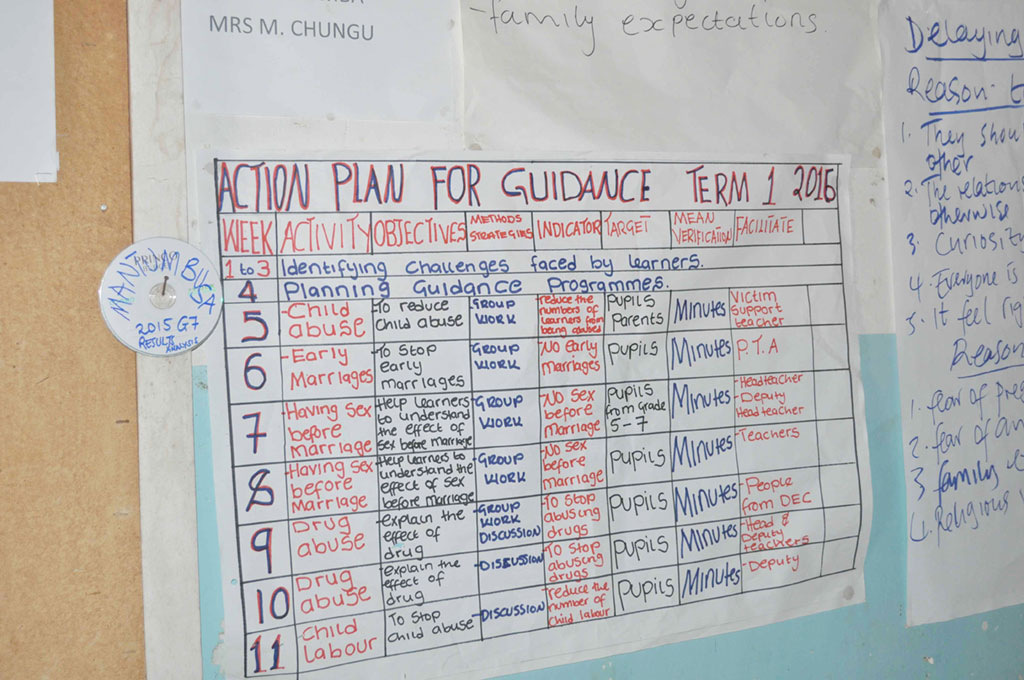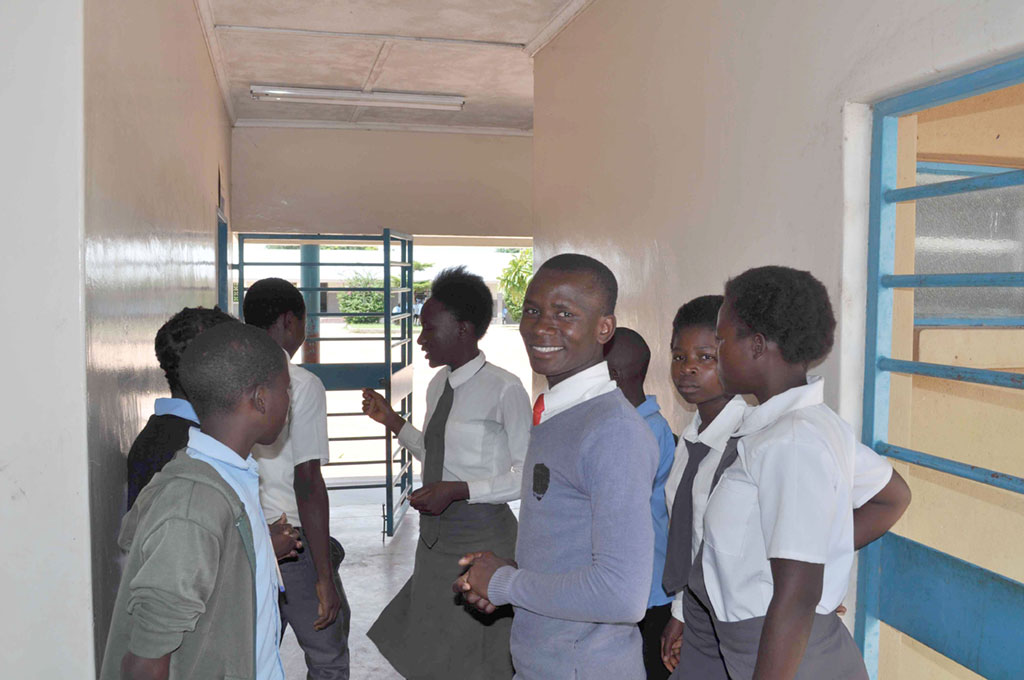Mwense, Zambia—Thirty-four adolescent students who had dropped out of school returned to their classes last year at Kasonge Primary School. What brought them back to school is fairly simple, says Head Teacher Goodson Chilando Mutuna.
“It is a matter of motivation…with the proper counseling they can change for the better,” he says.
Every one of these 34 boys and girls now has a better chance of finishing their education and succeeding in life, thanks to a combination of efforts including psychosocial support from the school’s guidance and counseling teacher, targeted outreach to families from community members, and peer to peer mentoring from a group known as Agents of Change.
These psychosocial initiatives are a key component of the Read to Succeed project, a “whole school, whole teacher, whole learner” approach to improve learning, teaching, school management, parental and community support and responsiveness to a child’s psychosocial needs in more than 1,200 schools across six Zambian provinces. The project is funded by the U.S. Agency for International Development and implemented by Creative Associates International.

The introduction of robust psychosocial services and training for educators is a welcome addition in a school system with a large number of vulnerable learners and previously few resources and know-how to support them.
“In the past, guidance and counseling services to learners were very few, but Read to Succeed has strengthened that assistance to learners,” says Charles Mupeta, Provincial Resource Center Coordinator for Luapula Province, where Kasonge Primary School is located.
Click here to see videos and stories from the special report, “Zambia: Turning the page for better schools.”
Countering dropout, reaching families
In rural Luapula Province, like in much of the country, poverty is widespread. Many students at Kasonge experience not only economic pressures but also the hazards of early marriage, teen pregnancy and HIV/AIDs, which has left many of them without one or both parents.
Whether children leave school to work, get married or care for others in a parentless household, the end result is the same—interrupted education and reduced prospects for wellbeing in adulthood.
Counselors are trained in how to identify, monitor and support orphans and vulnerable students, make referrals for services, and reach out to their families to address challenges.
For those vulnerable children and youth who manage to stay in school while dealing with social, economic and psychological challenges outside of the classroom, their learning will inevitably suffer.
“We know that if a child is affected socially, this child will not perform well,” explains Simon Kanchebele, Acting Provincial Education Standards Officer for Luapula Province.
It is a phenomenon all too familiar to the educators at Kasonge Primary School.
According to the latest school records, 84 children at the school have lost both parents. Another 123 have lost one parent, and 31 learners are considered vulnerable based on their precarious and impoverished living situations.
“Mostly the children we have at school come from eight rural villages. Most of them are coming from very poor families. They are double orphans, orphans or vulnerable children,” explains Mutuna.
But despite the challenges his young learners face, Mutuna says the guidance and counseling and outreach efforts are working—evidenced by the 34 youth once again filling the desks they had abandoned not long ago.
As the Mwense District’s Guidance and Counseling Coordinator, Mutuna has overseen the training of guidance and counseling teachers at all schools in the district in partnership with the USAID Read to Succeed project. The counselors are trained in how to identify, monitor and support orphans and vulnerable students, make referrals for services, and reach out to their families to encourage attendance and address psychosocial challenges at home that may impede learning.
When a student stops attending school, counselors team up with members of the School Community Partnership Committee to connect with families, discuss the obstacles preventing attendance, and work to develop solutions and reenroll learners.
“We know for sure that in a rural place like this, most parents have no regard for education…we have sensitized these parents,” says Mutuna.
Recently, when it became evident that many students in the district could not afford the pens and paper needed for class, guidance and counseling teachers helped provide school supplies to these vulnerable learners.
A powerful message from peers

As part of USAID Read to Succeed project, guidance and counseling teachers are also mobilizing a cadre of energetic and extremely effective allies to help support vulnerable students. Called Agents of Change, these groups of adolescents work side by side guidance and counseling teachers to deliver important messages to their classmates about staying in school, practicing healthy behaviors and making smart choices.
Agents of Change are trained on how to discuss sensitive subjects with their classmates like peer pressure, drugs and alcohol abuse, teen pregnancy and HIV/AIDs. The Agents of Change support their peers through challenging situations like the loss of parents, returning to school after a pregnancy or dropout, and resisting pressure to use drugs.
Dynes Musamba is only in the ninth grade, but as an Agent of Change at Mabumba Primary School in the Mansa District of Luapula Province, she is poised when discussing sensitive issues like teen pregnancy and peer pressure.
“Sometimes I just tell my friends: ‘If you have a problem, be frank with me and I can help and encourage you,’” she says.
Along with her seven fellow Agents of Change at Mabumba Primary School, she has helped bring friends back to school after they have dropped out, including teen mothers—an achievement in which she takes great pride.
“It is like a dream. I dreamed of helping others. It’s a great thing and I am very happy,” she says.
Through facilitated dialogues, skits and songs, she and her fellow Agents of Change also educate their peers on healthy behaviors, like how to avoid an HIV infection or pregnancy. The skits, say the Agents of Change, are especially powerful.
"We are coming to make sure we can all be someone in the future. I am proud because we are saving their lives." Isaac Songolo, Agent of Change
“They watch the skit as a movie and they keep it in their brains. After they finish, I tell them to sit down and think about it,” says seventh grade Agent of Change Mulenga Musamba.
At Mabumba Primary School alone, the group has delivered these key messages to dozens of their peers. Across the country, some 12, 330 Agents of Change are reaching thousands more youth with critical information about how to stay healthy and on track for education success, and how to access psychosocial support when in need.
In fact, since the project began in 2012, these Agents of Change have together reached 174,477 of their peers through regular monthly meetings in 1,233 schools.
“We have helped many people. We are coming to make sure we can all be someone in the future,” says ninth grade Agent of Change Isaac Songolo. “I am proud because we are saving their lives.”
With reporting by Nephas Hindamu
